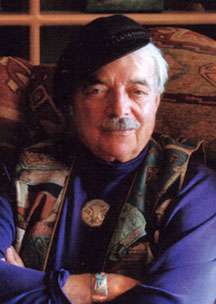By James Bishop Jr.
(June 3, 2014)
 Give me silence, water, hope
Give me silence, water, hope
Give me struggle, iron, volcanoes
–Neruda
As buzzards circled through the smoke above City Hall, a tourist from Maine mumbled to a lady of the night, “so this is what the end of the world looks like!” “Not so,” reported Josh, an expert member of the legendary, mythical Monkey Wrench Gang, “It’s just Ed. He said he come back, someday. He said he would settle for the sedate career, serene and soaring, of the humble turkey buzzard, the only known philosophizing bird.”
And what a world he’d come back too, not forgetting Sedona and Oak Creek in which he often swam along with lovely ladies. Were he return for a while, he’d learn that nuclear nut cases are still trying to mine uranium in and around Grand Canyon; robots are arising in many commercial outfits since so many people refuse to work in restaurants, saloons or most anywhere else.
A great conversationalist, he’d learn that most people Tweet and Text nowadays, choosing technological communication for the real thing. Before long he’d hear about state legislators with an eye toward abolishing environmental laws, business regulations and permit many people to carry weapons, in some cases in libraries. Not forgetting cell phones and where are any smelly bars, featuring aging sausages in dusty glass containers, upswept floors, dime beer, and no closing time. Finally, he once predicted that little towns across the Southwest might someday be swallowed up by global chain stores, throwing local workers to the wolves—which may be coming back by the way, so there is some good news.
Above all, he’d learned that the U.S. now has a black president a historic event but instead of being celebrated, it has emptied the cellars and attics of those which go bump in the night, intent in returning America to the days before the Civil War, even before the Revolution indeed when Christians slaughtered one another and mouthy women were hung.
Someday comes someday and this is a good time to celebrate Cactus Ed Abbey, after all he’s been gone for 25 years, sleeping silently amidst the rocks not far from the far back of beyond. “Ed was a warhorse, a wild horse, and one of a kind,” essayist Ed Hoagland told this scrivener. And while most books come and go like the seasons, like love affairs, like the wind, Joe Neri of Well Red Coyote says Abbey’s works still sell well, especially Desert Solitaire, year after year along with The Monkey Wrench Gang. Still alive with us is Abbey’s cry, “We can have wilderness without human life at all; but we cannot have freedom with wilderness.”
Born in the Appalachian Mountains, red-neck hillbilly, Abbey transformed himself during 40 odd years in the Southwest into park ranger, teacher, husband, father, scholar, desert prophet, world-renown author and trouble-maker for those eager to develop the land. Historians regard him as an iconoclast in the tradition of Mark Twain and Ambrose Bierce, a coyote trickster.
Not all among us were fans of his writings, but that did not faze him. Said he one day long ago, “When not ignored, my books are greeted with what I must recognize as a coolness verging on outright frigidity, particularly by the buzz saws of chickenshit liberalism. A near unanimous indifference sprinkled with peppery pockets of abuse—such has been the overall critical reception of thirty years in part-time literary travail.”
Eastern critics never liked his writing much. Either they did not understand him, and his works, or, more likely, they were angry that much of his writing punched holes in their dream that the Southwest was still a mythic, virgin wonderland, unmarred by Man, to which they could escape when the eastern states start to sink into a quagmire of crime, pollution, rising waters—and boredom.
As this scrivener sees it from the wheelchairs of his mind, Abbey is to the Southwest was Frost was it New England, Jim Muir to Yosemite, poet Wendell Berry to the land. Wrote he, “Ed was s red hot moment in the consciousness of the country. The half-life of his writings will be at least as long as that of uranium.”
Alike so many authors today, writing was a moral task. Writers worth their salt must oppose the powerful and give voice to the weak. To him there was a two-edged sword that was always glinting. By that I mean his characters were often wounded by life but they were also having fun.
In Abbey’s work, The Monkey Wrench Gang, Bonnie says to her lover, friend and river-running buddy George Washington Hayduke “amuse me. I am bored.” “Ok” he said, “what is the difference between the Lone Ranger and God?” She replied that this was stupid. “Ok,” said he “there really is a Lone Ranger.”





1 Comment
If he is returning, he does so without Tonto.